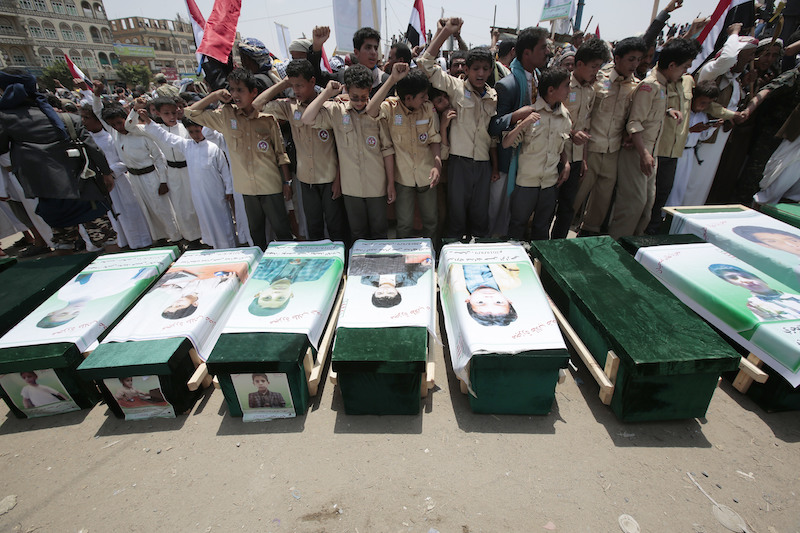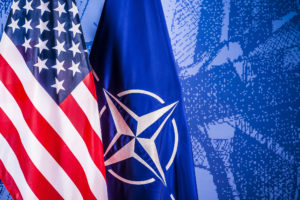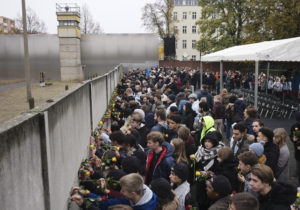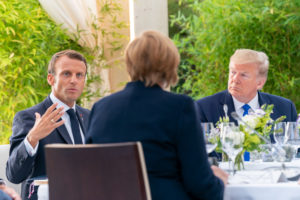Countries Selling Weapons to Saudi Arabia Weigh War Crimes Against Profits
Germany halted arms sales, but the U.S. keeps lucrative defense deals even as it condemns the murder of journalist Jamal Khashoggi. A funeral for victims of a Saudi-led airstrike that killed more than 50 people in Yemen, including children, in August. (Hani Mohammed / AP)
A funeral for victims of a Saudi-led airstrike that killed more than 50 people in Yemen, including children, in August. (Hani Mohammed / AP)
The Trump administration announced Friday that it will stop refueling Saudi coalition aircraft, a move that will likely have little effect as the U.S. continues to carry out lucrative arms deals with the kingdom. Norway, meanwhile, announced Friday that it will suspend new licenses for export of arms and other military equipment to Saudi Arabia.
Global pressure is mounting for countries to stop sending arms and other assistance to Saudi Arabia, which is accused of facilitating the murder of Washington Post columnist and regime critic Jamal Khashoggi in the Saudi consulate in Istanbul, Turkey. The Saudi-led coalition’s airstrikes on Yemen have killed 57,500 people since 2016, and its blockade has caused a deadly famine and cholera outbreak. German Chancellor Angela Merkel said in October that Germany will no longer export arms to the kingdom and referred to Khashoggi’s murder as “the monstrosity there in the Saudi consulate in Turkey.”
“Coalition airstrikes must cease in all populated areas in Yemen,” Secretary of State Mike Pompeo said last month. In August, a coalition airstrike in Yemen hit a bus filled with children returning home from summer camp, killing more than 50 people.
Donald Trump has touted a $110 billion weapons deal with Saudi Arabia. An accurate estimate is closer to $4 billion, which is nevertheless a massive amount of money. Saudi Arabia, for its part, has spent millions lobbying Washington.
“There should have never been an execution or a cover-up, because it should have never happened,” Trump said of Khashoggi’s killing. “I would say it was a total fiasco from day one.”
Military contractor Lockheed Martin CEO Marillyn Hewson said that the decision to sell arms to Saudi Arabia is entirely up to the government. “We do business through the U.S. government. We take their lead on what we sell to 70 countries. That’s what we will do in this case; it’s a matter of following the government’s lead.” The company’s sales to the kingdom have totaled $900 million for 2019 and 2020.
The Norwegian government took “a broad assessment of recent developments in Saudi Arabia and the unclear situation in Yemen,” according to Foreign Minister Ine Eriksen Soereide. In 2017, the country exported defense equipment to Saudi Arabia worth $4.9 million, according to Norwegian news agency NTB.
Germany recently has been a major arms supplier for Saudi Arabia, approving weapons exports worth more than $472 million so far this year. According to Norbert Roettgen, head of the nation’s parliamentary foreign affairs committee, “Even those deals that were already approved cannot happen now, as long as the case has not been resolved, and as long as there have been no substantial consequences in Riyadh. We would completely lose our credibility.”
Some members of the European Union have called for an arms embargo, noting that France and the United Kingdom are both major arms suppliers to Saudi Arabia. Spain initially halted a sale of 400 bombs to the kingdom over human rights concerns, but then went ahead with the deal in September.
Canadian Prime Minister Justin Trudeau has faced pressure to end a $15 billion arms agreement from 2014 with General Dynamics Corp. for armored vehicles. “The contract signed by the previous government … makes it very difficult to suspend or leave that contract,” Trudeau told the Canadian Broadcasting Corp.
Dennis Horak, Canada’s former ambassador to Saudi Arabia, also reduced the issue to one of economics:
Cancellation of the deal would only serve to punish the 3,000-plus Canadian workers in the London [Ontario] area who will see their high-skilled, middle class jobs disappear for a gesture with no consequences in Saudi Arabia. … The message they would hear would be, ‘So, you don’t want our $13 billion? Fine, someone else will.’ What does that achieve?
For those opposed to the war, though, it is clear that the issue is more complex than that of job protection for those who work at weapons companies. “Over the last three and a half years, Saudi-led forces have inflicted a terrible humanitarian catastrophe on Yemen,” said Andrew Smith of the Campaign Against Arms Trade, a nongovernmental organization based in the U.K. “We hope that the current pressure can serve as a turning point. For far too long, arms-dealing governments have prioritized arms company profits over the rights and lives of Yemeni people.”
“Now that it’s no longer a secret that the war in Yemen is a national security and humanitarian nightmare, we need to get all the way out,” said Sen. Chris Murphy, a Democrat from Connecticut.
Your support is crucial...As we navigate an uncertain 2025, with a new administration questioning press freedoms, the risks are clear: our ability to report freely is under threat.
Your tax-deductible donation enables us to dig deeper, delivering fearless investigative reporting and analysis that exposes the reality beneath the headlines — without compromise.
Now is the time to take action. Stand with our courageous journalists. Donate today to protect a free press, uphold democracy and uncover the stories that need to be told.






You need to be a supporter to comment.
There are currently no responses to this article.
Be the first to respond.